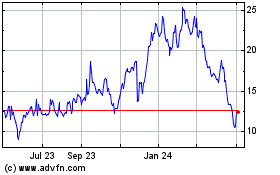false 0001759138 0001759138 2024-01-08 2024-01-08
UNITED STATES
SECURITIES AND EXCHANGE COMMISSION
Washington, D.C. 20549
FORM 8-K
CURRENT REPORT
Pursuant to Section 13 or 15(d)
of The Securities Exchange Act of 1934
Date of Report (Date of earliest event reported): January 8, 2024
CABALETTA BIO, INC.
(Exact name of registrant as specified in its charter)
|
|
|
|
|
| Delaware |
|
001-39103 |
|
82-1685768 |
(State or other jurisdiction
of incorporation) |
|
(Commission
File Number) |
|
(I.R.S. Employer
Identification No.) |
|
|
|
| 2929 Arch Street, Suite 600, Philadelphia, PA |
|
19104 |
| (Address of principal executive offices) |
|
(Zip Code) |
(267) 759-3100
(Registrant’s telephone number, including area code)
Not Applicable
(Former name or former address, if changed since last report)
Check the appropriate box below if the Form 8-K filing is intended to simultaneously satisfy the filing obligation of the registrant under any of the following provisions:
| ☐ |
Written communications pursuant to Rule 425 under the Securities Act (17 CFR 230.425) |
| ☐ |
Soliciting material pursuant to Rule 14a-12 under the Exchange Act (17 CFR 240.14a-12) |
| ☐ |
Pre-commencement communications pursuant to Rule 14d-2(b) under the Exchange Act (17 CFR 240.14d-2(b)) |
| ☐ |
Pre-commencement communications pursuant to Rule 13e-4(c) under the Exchange Act (17 CFR 240.13e-4(c)) |
Securities registered pursuant to Section 12(b) of the Act:
|
|
|
|
|
| Title of Each Class |
|
Trading
Symbol(s) |
|
Name of Each Exchange on Which Registered |
| Common Stock, par value $0.00001 per share |
|
CABA |
|
The Nasdaq Global Select Market |
Indicate by check mark whether the registrant is an emerging growth company as defined in Rule 405 of the Securities Act of 1933 (§230.405 of this chapter) or Rule 12b-2 of the Securities Exchange Act of 1934 (§240.12b-2 of this chapter).
Emerging growth company ☒
If an emerging growth company, indicate by check mark if the registrant has elected not to use the extended transition period for complying with any new or revised financial accounting standards provided pursuant to Section 13(a) of the Exchange Act. ☐
| Item 2.02 |
Results of Operations and Financial Condition. |
On January 8, 2024, Cabaletta Bio, Inc. (“Cabaletta” or the “Company”) disclosed that its unaudited cash, cash equivalents and short-term investments as of December 31, 2023 was $241 million. This cash balance is inclusive of the sale of 4,760,899 shares of common stock in the fourth quarter of 2023 under the Company’s “at-the-market” sales program (“ATM Program”) pursuant to the Sales Agreement, dated March 16, 2023 with Cowen and Company, LLC (“TD Cowen”) for aggregate gross proceeds of approximately $94.1 million, prior to deducting any discounts and fees under the Sales Agreement, at an average selling price of $19.76 per share.
The information contained in Item 2.02 of this Form 8-K is unaudited and preliminary and does not present all information necessary for an understanding of the Company’s financial condition as of December 31, 2023. The audit of the Company’s consolidated financial statements for the year ended December 31, 2023, is ongoing and could result in changes to the information set forth above.
The information contained in Item 2.02 of this Current Report on Form 8-K is being furnished and shall not be deemed to be “filed” for the purposes of Section 18 of the Securities Exchange Act of 1934, as amended (the “Exchange Act”), or otherwise subject to the liabilities of that section and shall not be incorporated by reference in any filing under the Securities Act of 1933, as amended (the “Securities Act”), or the Exchange Act, except as shall be expressly set forth by specific reference in such filing.
| Item 7.01 |
Regulation FD Disclosure. |
On January 8, 2024, the Company posted an updated corporation presentation (the “Corporate Presentation”) to the “Investors & Media” section of the Company’s website at www.cabalettabio.com. A copy of the Corporate Presentation is furnished herewith as Exhibit 99.1 to this Current Report on Form 8-K.
On January 8, 2024, the Company also issued a Press Release announcing that the U.S. Food and Drug Administration (the “FDA”) granted separate Fast Track Designations to CABA-201, an investigational 4-1BB-containing fully human CD19-CAR T cell therapy, for the treatment of patients with dermatomyositis to improve disease activity and for the treatment of patients with systemic sclerosis (“SSc”) to improve associated organ dysfunction (the “Press Release”). A copy of the Press Release is attached hereto as Exhibit 99.2 to this Current Report on Form 8-K.
The information contained in Item 7.01 of this Current Report on Form 8-K, including Exhibits 99.1 and 99.2 attached hereto, is being furnished and shall not be deemed to be “filed” for the purposes of Section 18 of the Exchange Act, or otherwise subject to the liabilities of that section and shall not be incorporated by reference in any filing under the Securities Act or the Exchange Act, except as shall be expressly set forth by specific reference in such filing.
On January 8, 2024, the Company provided the following corporate updates:
| |
• |
|
Fast Track Designation. The U.S. Food and Drug Administration has granted separate Fast Track Designations to CABA-201, an investigational 4-1BB-containing fully human CD19-CAR T cell therapy, for the treatment of patients with dermatomyositis to improve disease activity and for the treatment of patients with systemic sclerosis to improve associated organ dysfunction. |
| |
• |
|
CABA-201 REstoring SElf-Tolerance (RESET™) Phase 1/2 Trials. Cabaletta is evaluating CABA-201 in four Phase 1/2 clinical trials with a total of nine cohorts that can advance simultaneously, employing a similar parallel cohort design and starting dose of 1 x 106 cells/kg without a dose escalation requirement. Cabaletta anticipates reporting initial clinical efficacy and tolerability data for patients treated with CABA-201 from the Phase 1/2 trials in systemic lupus erythematosus (“SLE”) and myositis in the first half of 2024 and in SSc and generalized myasthenia gravis (“gMG”) in the second half of 2024. |
| |
• |
|
Preclinical Portfolio Expansion for CABA-201 Indications. In 2024, Cabaletta aims to broaden its portfolio with potential Investigational New Drug applications (“INDs”) for CABA-201 in multiple additional autoimmune disease indications in which B cells play a key role. These new indications have a combined U.S. prevalence of over one million patients. |
| |
• |
|
ATM Program. During the fourth quarter of 2023, largely catalyzed by block inquiry from institutional investors, the Company sold 4,760,899 shares of its common stock under its ATM Program pursuant to the Sales Agreement. The Company raised approximately $94.1 million in gross proceeds prior to deducting any discounts and fees under the Sales Agreement or offering expenses, at an average selling price of $19.76 per share. |
| |
• |
|
Cash Runway. Based upon the Company’s current operating plan, the Company believes that its existing cash, cash equivalents and short-term investments as of December 31, 2023 will enable it to fund its operating expenses and capital expenditure requirements into the first half of 2026. |
Forward-Looking Statements
The information under this Item 8.01 contains “forward-looking statements” of the Company within the meaning of the Private Securities Litigation Reform Act of 1995, as amended, including without limitation, express or implied statements regarding its expectations regarding: Cabaletta’s ability to broaden its portfolio with potential INDs for CABA-201 in multiple autoimmune disease indications; the anticipated market opportunities for CABA-201 in additional autoimmune indications; the Company’s business plans and objectives; the Company’s plans to progress four separate Phase 1/2 clinical trials of CABA-201 in subjects with gMG, SSc, SLE and myositis; Cabaletta’s ability to enroll the requisite number of patients and dose each dosing cohort in the intended manner in its Phase 1/2 clinical trials of CABA-201; and the Company’s anticipated use of capital, expenses and other future financial results, including the ability to fund operations into the first half of 2026. Any forward-looking statements in this Item 8.01 are based on management’s current expectations and beliefs of future events, and are subject to a number of risks and uncertainties that could cause actual results to differ materially and adversely from those set forth in or implied by such forward-looking statements. These risks and uncertainties include, but are not limited to: risks related to regulatory filings and potential clearance; the risk that signs of biologic activity or persistence may not inform long-term results; Cabaletta’s ability to demonstrate sufficient evidence of safety, efficacy and tolerability in its preclinical studies and clinical trials of DSG3-CAART, MuSK-CAART and CABA-201; the risk that the results observed with the similarly-designed construct employed in the recent academic publications, including due to the dosing regimen, are not indicative of the results we seek to achieve with CABA-201; risks related to clinical trial site activation or enrollment rates that are lower than expected; risks related to unexpected safety or efficacy data observed during clinical studies; risks related to volatile market and economic conditions and public health crises; risks related to Cabaletta’s ability to protect and maintain its intellectual property position; risks related to fostering and maintaining successful relationships with Cabaletta’s collaboration and manufacturing partners; and the risk that the initial or interim results of preclinical studies or clinical studies will not be predictive of future results in connection with future studies. For a discussion of these and other risks and uncertainties, and other important factors, any of which could cause Cabaletta’s actual results to differ from those contained in the forward-looking statements, see the section entitled “Risk Factors” in Cabaletta’s most recent annual report on Form 10-K as well as discussions of potential risks, uncertainties, and other important factors in Cabaletta’s other and subsequent filings with the Securities and Exchange Commission. All information in this Item 8.01 is as of the date of this Current Report on Form 8-K, and the Company undertakes no duty to update this information unless required by law.
| Item 9.01 |
Financial Statements and Exhibits. |
(d) Exhibits
SIGNATURE
Pursuant to the requirements of the Securities Exchange Act of 1934, as amended, the registrant has duly caused this report to be signed on its behalf by the undersigned, hereunto duly authorized.
|
|
|
|
|
|
|
|
|
|
|
CABALETTA BIO, INC. |
|
|
|
|
| Date: January 8, 2024 |
|
|
|
By: |
|
/s/ Steven Nichtberger |
|
|
|
|
|
|
Steven Nichtberger, M.D. |
|
|
|
|
|
|
President and Chief Executive Officer |

Exhibit 99.1 Corporate Presentation JANUARY 2024 © 2024 Cabaletta
Bio. All rights reserved.

Disclaimer The following presentation, including any printed or
electronic copy of these slides, the talks given by the presenters, the information communicated during any delivery of the presentation and any question and answer session and any document or material distributed at or in connection with the
presentation (collectively, the “Presentation”) has been prepared by Cabaletta Bio, Inc. (“we,” “us,” “our,” “Cabaletta” or the “Company”) and is made for informational purposes
only. This Presentation does not purport to be a prospectus, to be complete or to contain all of the information you may desire. Statements contained herein are made as of the date of this Presentation unless stated otherwise, and this Presentation
shall not under any circumstances create an implication that the information contained herein is correct as of any time after such date or that information will be updated or revised to reflect information that subsequently becomes available or
changes occurring after the date hereof. This Presentation may contain “forward-looking statements” within the meaning of the Private Securities Litigation Reform Act of 1995 relating to our business, operations, and financial
conditions, and include, but are not limited to, express or implied statements regarding our current beliefs, expectations and assumptions regarding: our business, future plans and strategies for our CAAR T and CARTA technologies; our ability to
grow our autoimmune-focused pipeline; the ability to capitalize on and potential benefits resulting from our research and translational insights; the anticipated market opportunities for CABA-201 in patients with autoimmune diseases; the
Company’s business plans and objectives; our expectations around the potential success and therapeutic benefits of CABA-201, including our belief that CABA-201 may enable an “immune system reset”; our plans for Phase 1/2 clinical
trials of CABA-201 in patients with systemic lupus erythematosus (SLE), myositis, SSc, and generalized myasthenia gravis (gMG), including our anticipated progress, enrollment, clinical trial design, and ability to leverage our experience in
autoimmune cell therapy; our planned initial clinical data read-out in the first half of 2024 for patients with myositis and SLE treated with CABA-201; our planned initial clinical data read-out in the second half of 2024 for patients with SSc and
gMG treated with CABA-201; our ability to enroll the requisite number of patients, dose each dosing cohort in the intended manner, and advance the trial as planned in our Phase 1/2 clinical trials of CABA- 201; the ability to retain and recognize
the intended incentives conferred by any Fast Track Designations for CABA-201; the timing any planned regulatory filings for our development programs; the progress and results of our DesCAARTes™ Phase 1 trial, including the significance and
impact around reported safety and clinical and translational data of cohorts from our DesCAARTes™ and MusCAARTes™ Phase 1; the therapeutic potential and clinical benefits of our product candidates; the expectation that Cabaletta may
improve outcomes for patients suffering from SLE, SSc, myositis, gMG, mucosal pemphigus vulgaris, MuSK myasthenia gravis, or other autoimmune diseases; the ability of our clinical strategy to reduce risk, maximize reach and accelerate timelines of
our Phase 1/2 clinical trials of CABA-201; our ability to optimize and scale the patient and provider experience; our ability to successfully complete our preclinical and clinical studies for our product candidates, including our ability to enroll
the requisite number of patients, dose each dosing cohort in the intended manner, and progress the trial; our ability to obtain and maintain regulatory approval of our product candidates, including our expectations regarding the intended incentives
conferred by and ability to retain Orphan Drug Designation and Fast Track Designations for our product candidates, as applicable; our ability to accelerate our pipeline and to develop meaningful therapies for patients, including in collaboration
with academic and industry partners and the ability to optimize such collaborations on our development programs; our ability to contract with third-party suppliers and manufacturers, implement an enhanced manufacturing process and further develop
our internal manufacturing strategy, capabilities and facilities; our potential commercial opportunities, including value and addressable market, for our product candidates; and our expectations regarding our use of capital and other financial
results, including our ability to fund operations into the first half of 2026. Words such as, but not limited to, “look forward to,” “believe,” “expect,” “anticipate,” “estimate,”
“intend,” “plan,” “would,” “should” and “could,” and similar expressions or words, identify forward-looking statements. Various risks, uncertainties and assumptions could cause actual
results to differ materially from those anticipated or implied in our forward-looking statements. Such risks and uncertainties include, but are not limited to, risks related to the success, cost, and timing of our product candidate development
activities and preclinical studies and clinical trials, risks related to our ability to demonstrate sufficient evidence of safety, efficacy and tolerability in our preclinical studies and clinical trials of CABA-201, DSG3-CAART and MuSK-CAART, the
risk that the results observed with the similarly-designed construct, including, but not limited to, due to dosing regimen, are not indicative of the results we seek to achieve with CABA-201, our plans to evaluate additional cohorts in the
DesCAARTes™ trial, including a cohort implementing a pre-treatment regimen, the risk that signs of biologic activity or persistence may not inform long-term results, the risk that persistence observed with effective CART-19 oncology studies in
combination with lymphodepletion is not indicative of, or applicable to, clinical responses in patients with mPV, risks related to clinical trial site activation or enrollment rates that are lower than expected, our ability to protect and maintain
our intellectual property position, risks related to our relationships with third parties, uncertainties related to regulatory agencies’ evaluation of regulatory filings and other information related to our product candidates, our ability to
retain and recognize the intended incentives conferred by any Orphan Drug Designations and Fast Track Designations, risks related to regulatory filings and potential clearance, the risk that any one or more of our product candidates will not be
successfully developed and commercialized, the risk that the results of preclinical studies or clinical studies will not be predictive of future results in connection with future studies, and risks related to volatile market and economic conditions
and public health crises. New risks and uncertainties may emerge from time to time, and it is not possible to predict all risks and uncertainties. Except as required by applicable law, we do not plan to publicly update or revise any forward-looking
statements contained herein, whether as a result of any new information, future events, changed circumstances or otherwise. Although we believe the expectations reflected in such forward-looking statements are reasonable, we can give no assurance
that such expectations will prove to be correct. Accordingly, you are cautioned not to place undue reliance on these forward-looking statements. No representations or warranties (expressed or implied) are made about the accuracy of any such
forward-looking statements. For a discussion of these and other risks and uncertainties, and other important factors, any of which could cause our actual results to differ materially from those contained in the forward-looking statements, see the
section entitled Risk Factors in our most recent annual report on Form 10-K, as well as discussions of potential risks, uncertainties, and other important factors in our other and subsequent filings with the Securities and Exchange Commission.
Certain information contained in this Presentation relates to or is based on studies, publications, surveys and other data obtained from third-party sources and the Company’s own internal estimates and research. While the Company believes
these third-party sources to be reliable as of the date of this Presentation, it has not independently verified, and makes no representation as to the adequacy, fairness, accuracy or completeness of, any information obtained from third-party
sources. The Company is the owner of various trademarks, trade names and service marks. Certain other trademarks, trade names and service marks appearing in this Presentation are the property of third parties. Solely for convenience, the trademarks
and trade names in this Presentation are referred to without the ® and TM symbols, but such references should not be construed as any indicator that their respective owners will not assert, to the fullest extent under applicable law, their
rights thereto. 2

Develop and launch the first curative targeted cellular therapies for
patients with autoimmune diseases 3 3

Realizing the vision to transform autoimmune disease treatment 2H24:
Initial clinical data systemic sclerosis & generalized 1H24: myasthenia Initial clinical data gravis myositis & systemic lupus Designed novel Phase 1/2 trials erythematosus to accelerate path to approval • no requirement for dose
escalation • independent, parallel 6-patient cohorts • broad portfolio of indications Engineered CABA-201 specifically for use in autoimmune patients Securing scalable commercial manufacturing Expanding to multiple additional indications
Initiated enrollment Cash runway Innovating to optimize patient & physician experience in CABA-201 program into 1H26 4

Pipeline targeting autoimmune diseases with high unmet need Innovative
and scalable clinical strategy with potential for accelerated development path Phase 1/2 Pivotal Program Trial Preclinical Dermatomyositis Rheumatology Neurology RESET-Myositis™ Anti-synthetase syndrome Dermatology IMNM Lupus Nephritis FTD
RESET-SLE™ CABA-201 Non-Renal SLE 4-1BB CD19-CAR T Skin + Organ Cohort IND RESET-SSc™ cleared Skin Cohort AChR-Ab pos. gMG IND RESET-MG™ cleared AChR-Ab neg. gMG FTD 1 DesCAARTes™ Mucosal pemphigus vulgaris CAART Chimeric
AutoAntibody 1 MuSK-Ab positive MG Receptor T cells MusCAARTes™ Expanding the potential application of CABA-201 to multiple additional indications in 2024 RESET™ – REstoring SElf-Tolerance; IMNM – Immune-mediated necrotizing
myopathy; SLE – Systemic lupus erythematosus; Ab – Antibody; AChR – Acetylcholine receptor; gMG – Generalized myasthenia gravis 1. Currently being evaluated in a Phase 1 trial. 5 2. FDA Fast Track Designation received in
dermatomyositis, SLE, lupus nephritis, systemic sclerosis, mucosal pemphigus vulgaris, and MuSK-Ab positive MG.

Chimeric Antigen Receptor T Cells for Autoimmunity CABA-201 6
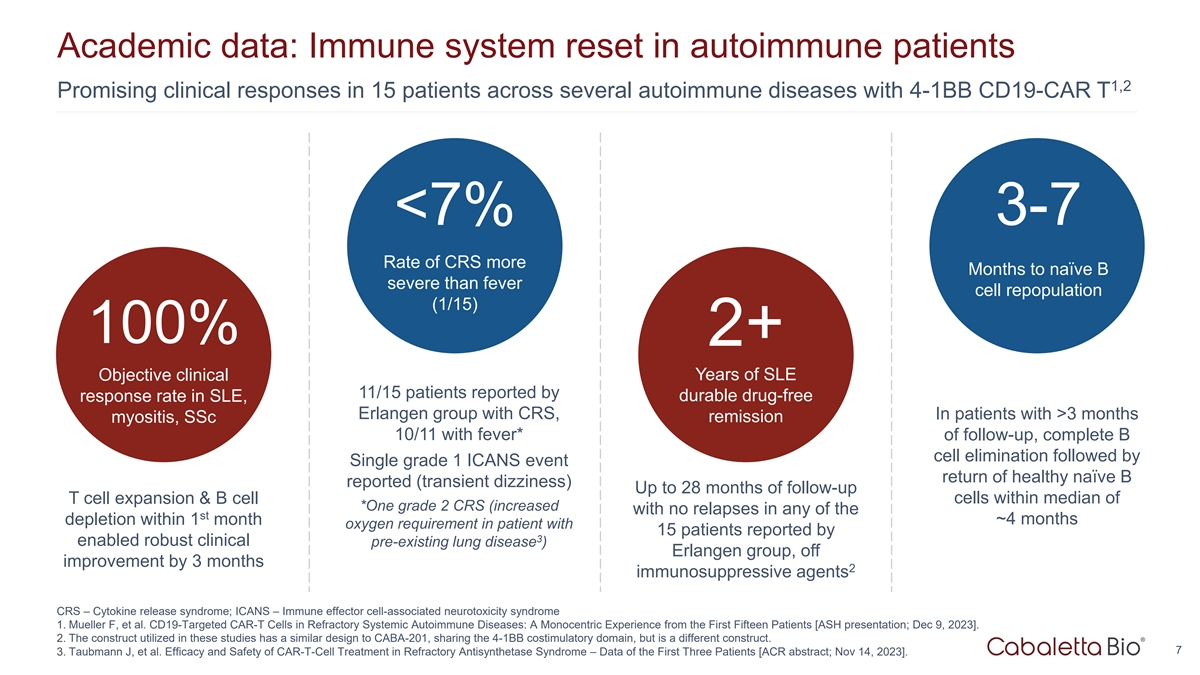
Academic data: Immune system reset in autoimmune patients 1,2 Promising
clinical responses in 15 patients across several autoimmune diseases with 4-1BB CD19-CAR T <7% 3-7 Rate of CRS more Months to naïve B severe than fever cell repopulation (1/15) 100% 2+ Years of SLE Objective clinical 11/15 patients reported
by durable drug-free response rate in SLE, Erlangen group with CRS, In patients with >3 months myositis, SSc remission 10/11 with fever* of follow-up, complete B cell elimination followed by Single grade 1 ICANS event return of healthy naïve
B reported (transient dizziness) Up to 28 months of follow-up T cell expansion & B cell cells within median of *One grade 2 CRS (increased with no relapses in any of the st depletion within 1 month ~4 months oxygen requirement in patient with 15
patients reported by 3 enabled robust clinical pre-existing lung disease ) Erlangen group, off improvement by 3 months 2 immunosuppressive agents CRS – Cytokine release syndrome; ICANS – Immune effector cell-associated neurotoxicity
syndrome 1. Mueller F, et al. CD19-Targeted CAR-T Cells in Refractory Systemic Autoimmune Diseases: A Monocentric Experience from the First Fifteen Patients [ASH presentation; Dec 9, 2023]. 2. The construct utilized in these studies has a similar
design to CABA-201, sharing the 4-1BB costimulatory domain, but is a different construct. 7 3. Taubmann J, et al. Efficacy and Safety of CAR-T-Cell Treatment in Refractory Antisynthetase Syndrome – Data of the First Three Patients [ACR
abstract; Nov 14, 2023].
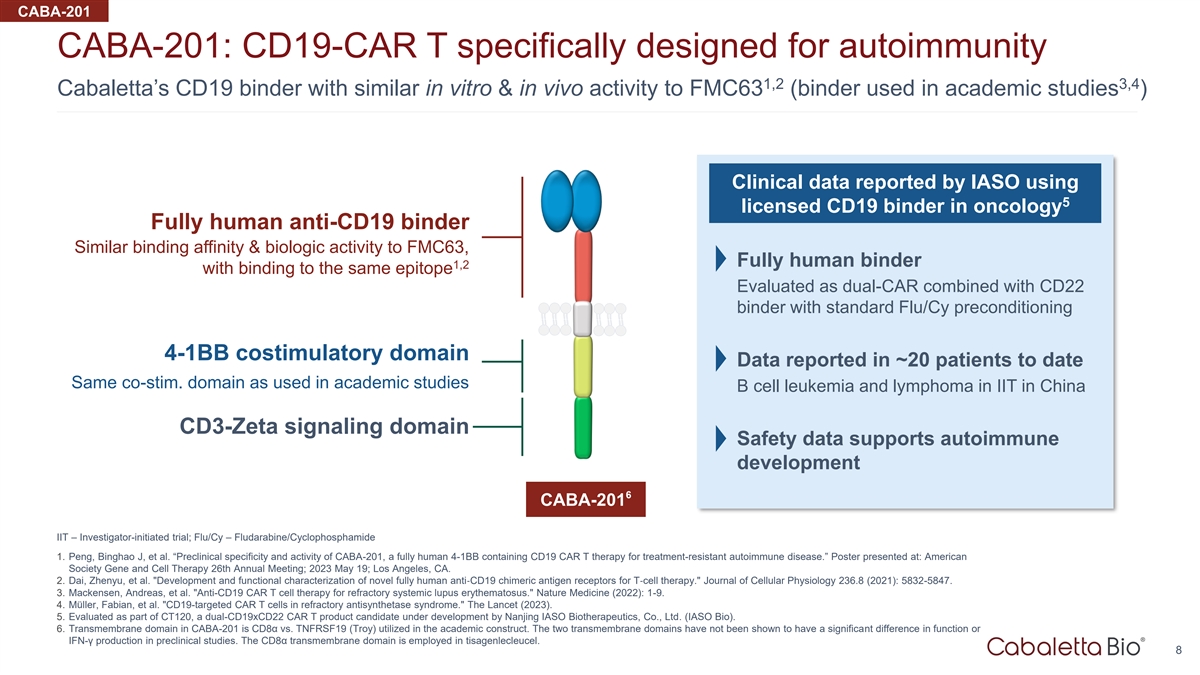
CABA-201 CABA-201: CD19-CAR T specifically designed for autoimmunity 1,2
3,4 Cabaletta’s CD19 binder with similar in vitro & in vivo activity to FMC63 (binder used in academic studies ) Clinical data reported by IASO using 5 licensed CD19 binder in oncology Fully human anti-CD19 binder Similar binding affinity
& biologic activity to FMC63, Fully human binder 1,2 with binding to the same epitope Evaluated as dual-CAR combined with CD22 binder with standard Flu/Cy preconditioning 4-1BB costimulatory domain Data reported in ~20 patients to date Same
co-stim. domain as used in academic studies B cell leukemia and lymphoma in IIT in China CD3-Zeta signaling domain Safety data supports autoimmune development 6 CABA-201 IIT – Investigator-initiated trial; Flu/Cy –
Fludarabine/Cyclophosphamide 1. Peng, Binghao J, et al. “Preclinical specificity and activity of CABA-201, a fully human 4-1BB containing CD19 CAR T therapy for treatment-resistant autoimmune disease.” Poster presented at: American
Society Gene and Cell Therapy 26th Annual Meeting; 2023 May 19; Los Angeles, CA. 2. Dai, Zhenyu, et al. Development and functional characterization of novel fully human anti‐CD19 chimeric antigen receptors for T‐cell therapy. Journal of
Cellular Physiology 236.8 (2021): 5832-5847. 3. Mackensen, Andreas, et al. Anti-CD19 CAR T cell therapy for refractory systemic lupus erythematosus. Nature Medicine (2022): 1-9. 4. Müller, Fabian, et al. CD19-targeted CAR T cells in refractory
antisynthetase syndrome. The Lancet (2023). 5. Evaluated as part of CT120, a dual-CD19xCD22 CAR T product candidate under development by Nanjing IASO Biotherapeutics, Co., Ltd. (IASO Bio). 6. Transmembrane domain in CABA-201 is CD8α vs.
TNFRSF19 (Troy) utilized in the academic construct. The two transmembrane domains have not been shown to have a significant difference in function or IFN-γ production in preclinical studies. The CD8α transmembrane domain is employed in
tisagenlecleucel. 8

CABA-201 REstoring SElf-Tolerance (RESET™) Phase 1/2 trials
advancing SLE & myositis trials currently recruiting, with a broadening portfolio to realize the potential of CABA-201 Phase 1/2 Trials Preclinical Rheum Myositis SLE SSc gMG 2024 Neuro Undiscl. > > > > Typical onset middle age
Affects young women & Middle age onset common Bimodal age of onset people of color Autoimmune diseases Only FDA-approved Progressive skin & organ Profound weakness that in which B cells play a therapy is IVIg in DM ~40% with lupus nephritis,
fibrosis with lung, cardiac, can be disabling key role which carries ~25% risk of renal damage High mortality due to lung Risk for myasthenic crises, death or ESRD within 10y & cardiac involvement Average survival of 12y with respiratory failure
U.S. ~66k ~160-320k ~88k ~55k Over 1 million Prevalence Current therapies offer modest efficacy & often result in chronic and broad immunosuppression 9 SLE – Systemic lupus erythematosus; DM – Dermatomyositis; SSc – Systemic
sclerosis; gMG – Generalized myasthenia gravis; ESRD – End-stage renal disease
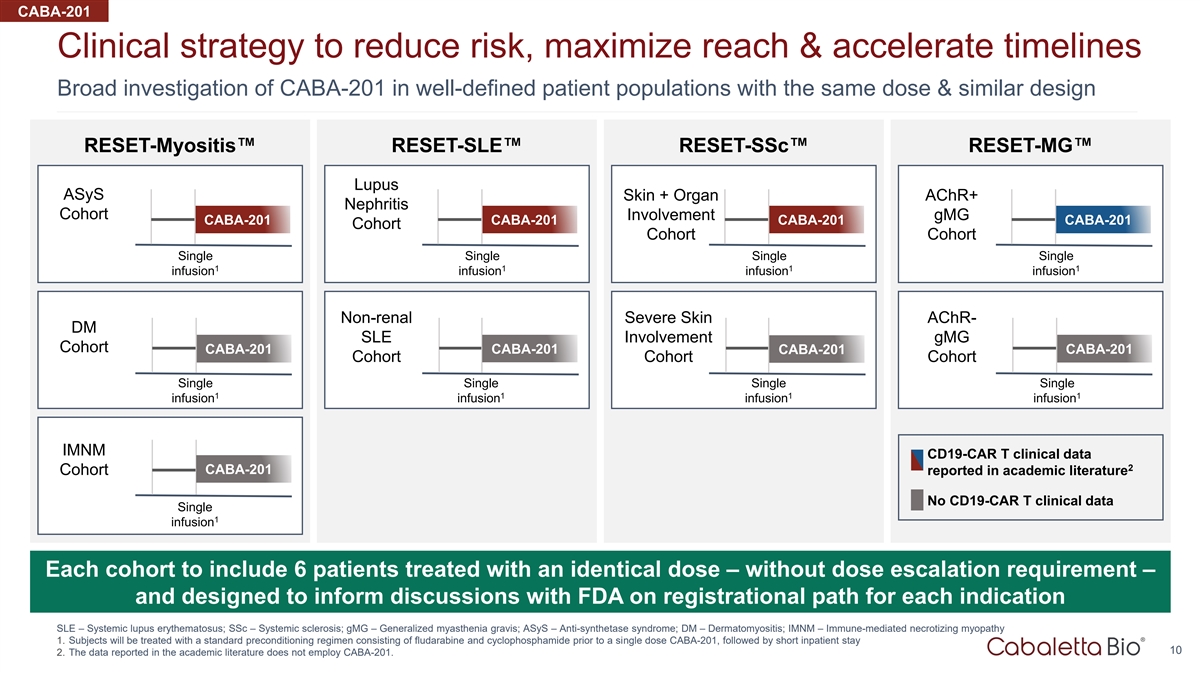
CABA-201 Clinical strategy to reduce risk, maximize reach &
accelerate timelines Broad investigation of CABA-201 in well-defined patient populations with the same dose & similar design RESET-Myositis™ RESET-SLE™ RESET-SSc™ RESET-MG™ Lupus ASyS Skin + Organ AChR+ Nephritis Cohort
Involvement gMG CABA-201 CABA-201 CABA-201 CABA-201 Cohort Cohort Cohort Single Single Single Single 1 1 1 1 infusion infusion infusion infusion Non-renal Severe Skin AChR- DM SLE Involvement gMG Cohort CABA-201 CABA-201 CABA-201 CABA-201 Cohort
Cohort Cohort Single Single Single Single 1 1 1 1 infusion infusion infusion infusion IMNM CD19-CAR T clinical data 2 CABA-201 Cohort reported in academic literature No CD19-CAR T clinical data Single 1 infusion Each cohort to include 6 patients
treated with an identical dose – without dose escalation requirement – and designed to inform discussions with FDA on registrational path for each indication SLE – Systemic lupus erythematosus; SSc – Systemic sclerosis; gMG
– Generalized myasthenia gravis; ASyS – Anti-synthetase syndrome; DM – Dermatomyositis; IMNM – Immune-mediated necrotizing myopathy 1. Subjects will be treated with a standard preconditioning regimen consisting of fludarabine
and cyclophosphamide prior to a single dose CABA-201, followed by short inpatient stay 10 2. The data reported in the academic literature does not employ CABA-201.
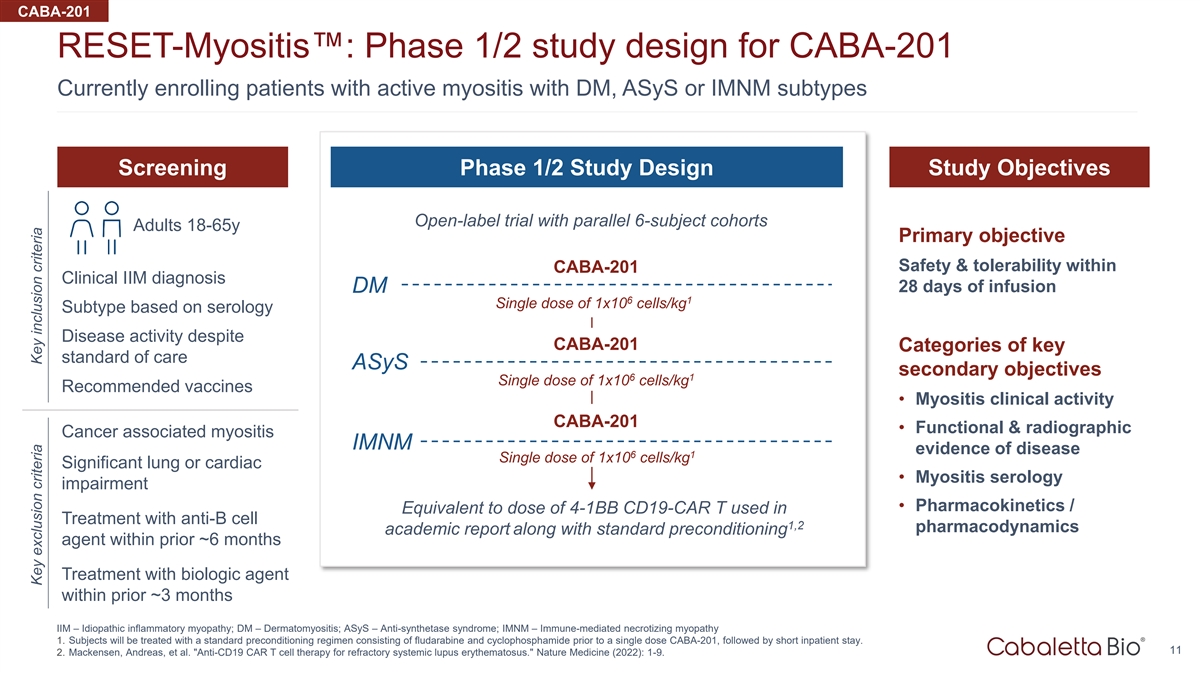
CABA-201 RESET-Myositis™: Phase 1/2 study design for CABA-201
Currently enrolling patients with active myositis with DM, ASyS or IMNM subtypes Screening Phase 1/2 Study Design Study Objectives Open-label trial with parallel 6-subject cohorts Adults 18-65y Primary objective Safety & tolerability within
CABA-201 Clinical IIM diagnosis DM 28 days of infusion 6 1 Single dose of 1x10 cells/kg Subtype based on serology Disease activity despite CABA-201 Categories of key standard of care ASyS secondary objectives 6 1 Single dose of 1x10 cells/kg
Recommended vaccines • Myositis clinical activity CABA-201 • Functional & radiographic Cancer associated myositis IMNM evidence of disease 6 1 Single dose of 1x10 cells/kg Significant lung or cardiac • Myositis serology
impairment • Pharmacokinetics / Equivalent to dose of 4-1BB CD19-CAR T used in Treatment with anti-B cell 1,2 pharmacodynamics academic report along with standard preconditioning agent within prior ~6 months Treatment with biologic agent
within prior ~3 months IIM – Idiopathic inflammatory myopathy; DM – Dermatomyositis; ASyS – Anti-synthetase syndrome; IMNM – Immune-mediated necrotizing myopathy 1. Subjects will be treated with a standard preconditioning
regimen consisting of fludarabine and cyclophosphamide prior to a single dose CABA-201, followed by short inpatient stay. 11 2. Mackensen, Andreas, et al. Anti-CD19 CAR T cell therapy for refractory systemic lupus erythematosus. Nature Medicine
(2022): 1-9. Key exclusion criteria Key inclusion criteria

CABA-201 RESET-SLE™: Phase 1/2 study design for CABA-201
Currently enrolling patients with active SLE with or without renal involvement Screening Phase 1/2 Study Design Study Objectives Open-label trial with parallel 6-subject cohorts Adults 18-65y Primary objective Safety & tolerability within
Clinical SLE diagnosis CABA-201 SLE with lupus 28 days of infusion Confirmatory serology nephritis 6 1 Single dose of 1x10 cells/kg Disease activity despite Categories of key standard of care secondary objectives CABA-201 SLE without Recommended
vaccines • SLE clinical activity 6 1 renal disease Single dose of 1x10 cells/kg • SLE serology Treatment with anti-B cell • Pharmacokinetics / agent within prior ~6 months Equivalent to dose of 4-1BB CD19-CAR T used in
pharmacodynamics 1,2 academic report along with standard preconditioning Treatment with biologic agent within prior ~3 months Similarly designed Phase 1/2 trials – RESET-SSc™ & RESET-MG™ – advancing in SSc & gMG SLE
– Systemic lupus erythematosus; SSc – Systemic sclerosis; gMG – Generalized myasthenia gravis 1. Subjects will be treated with a standard preconditioning regimen consisting of fludarabine and cyclophosphamide prior to a single dose
CABA-201, followed by short inpatient stay. 12 2. Mackensen, Andreas, et al. Anti-CD19 CAR T cell therapy for refractory systemic lupus erythematosus. Nature Medicine (2022): 1-9. Key exclusion criteria Key inclusion criteria
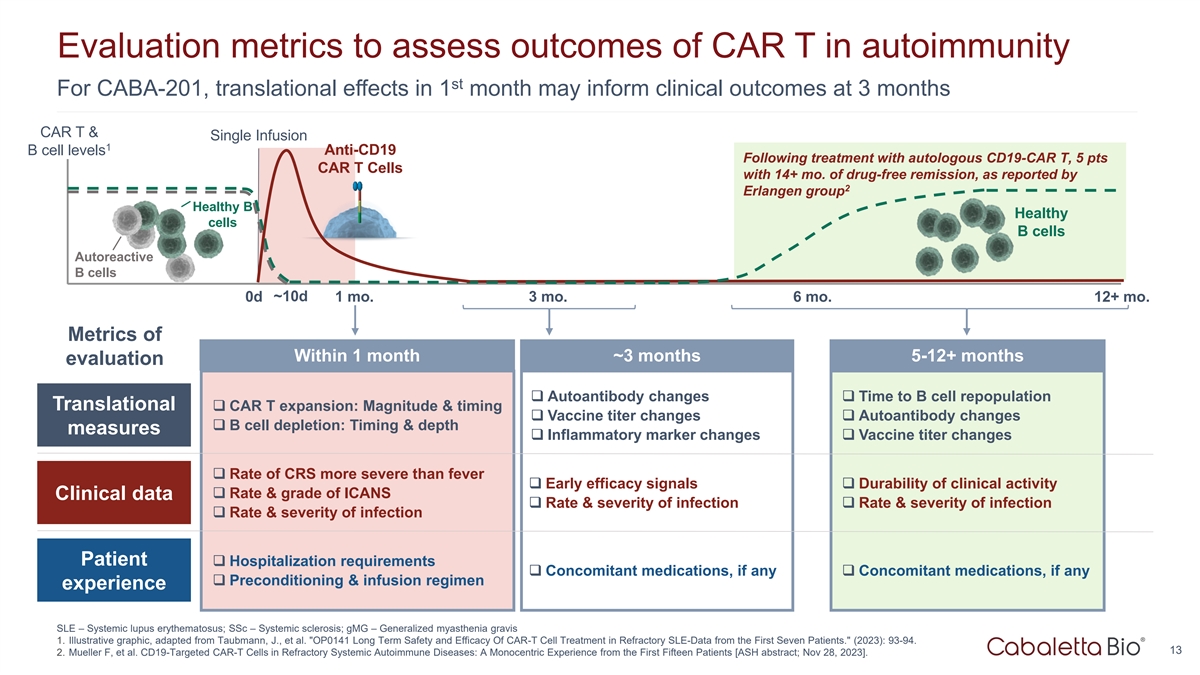
Evaluation metrics to assess outcomes of CAR T in autoimmunity st For
CABA-201, translational effects in 1 month may inform clinical outcomes at 3 months CAR T & Single Infusion 1 B cell levels Anti-CD19 Following treatment with autologous CD19-CAR T, 5 pts CAR T Cells with 14+ mo. of drug-free remission, as
reported by 2 Erlangen group Healthy B Healthy cells B cells Autoreactive B cells ~10d 0d 1 mo. 3 mo. 6 mo. 12+ mo. Metrics of Within 1 month ~3 months 5-12+ months evaluation ❑ Autoantibody changes❑ Time to B cell repopulation
Translational ❑ CAR T expansion: Magnitude & timing ❑ Vaccine titer changes❑ Autoantibody changes ❑ B cell depletion: Timing & depth measures ❑ Inflammatory marker changes❑ Vaccine titer changes
❑ Rate of CRS more severe than fever ❑ Early efficacy signals❑ Durability of clinical activity ❑ Rate & grade of ICANS Clinical data ❑ Rate & severity of infection❑ Rate & severity of infection
❑ Rate & severity of infection Patient ❑ Hospitalization requirements ❑ Concomitant medications, if any❑ Concomitant medications, if any ❑ Preconditioning & infusion regimen experience SLE – Systemic
lupus erythematosus; SSc – Systemic sclerosis; gMG – Generalized myasthenia gravis 1. Illustrative graphic, adapted from Taubmann, J., et al. OP0141 Long Term Safety and Efficacy Of CAR-T Cell Treatment in Refractory SLE-Data from the
First Seven Patients. (2023): 93-94. 13 2. Mueller F, et al. CD19-Targeted CAR-T Cells in Refractory Systemic Autoimmune Diseases: A Monocentric Experience from the First Fifteen Patients [ASH abstract; Nov 28, 2023].

Manufacturing strategy Staged approach allows for efficient allocation
of capital while leveraging experienced partners Early Phase: Late Phase & Commercial: Penn, CDMOs & CABA Process Scale-Up & Commercialization Data-gated, staged investment Ongoing • Penn has reliably provided timely product for
years • Evaluating potential paths to commercial-ready manufacturing: • Commercial CDMO partnerships have expanded • Expansion of CDMO relationships our vector and cell product supply • Cabaletta-operated facility •
Strategic partnership(s) • Continuous focus on innovations to address scale Preparations ongoing to implement commercial-ready process in advance of pivotal studies 14
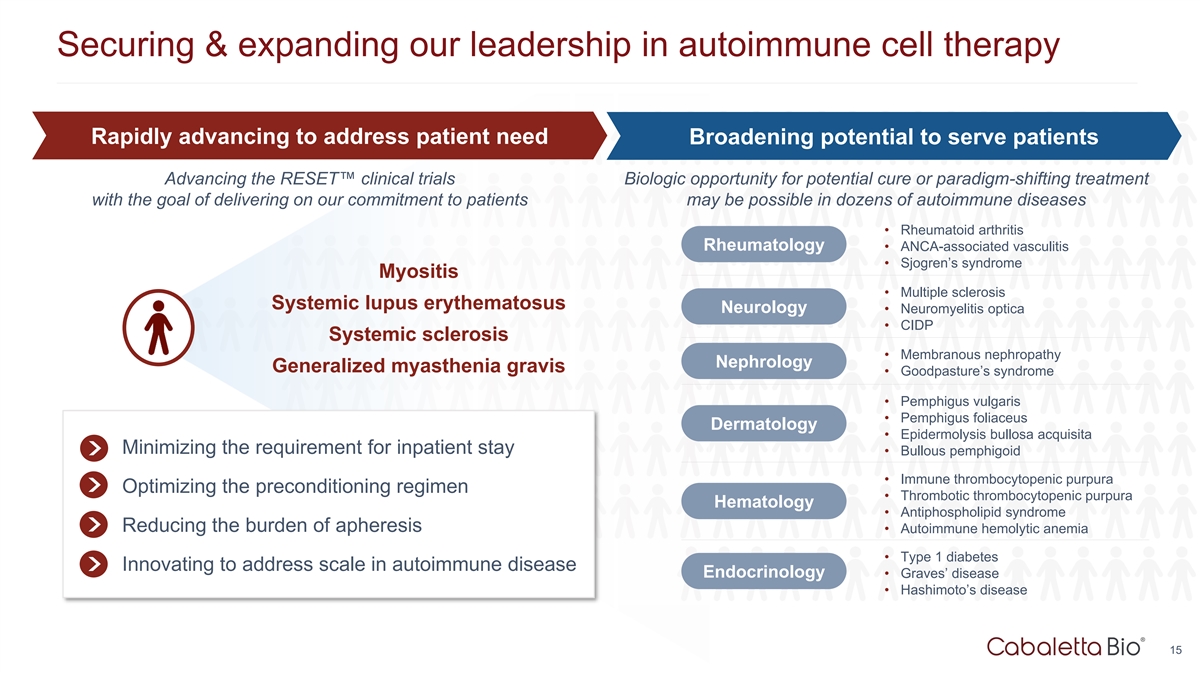
Securing & expanding our leadership in autoimmune cell therapy
Rapidly advancing to address patient need Broadening potential to serve patients Advancing the RESET™ clinical trials Biologic opportunity for potential cure or paradigm-shifting treatment with the goal of delivering on our commitment to
patients may be possible in dozens of autoimmune diseases • Rheumatoid arthritis Rheumatology • ANCA-associated vasculitis • Sjogren’s syndrome Myositis • Multiple sclerosis Systemic lupus erythematosus Neurology
• Neuromyelitis optica • CIDP Systemic sclerosis • Membranous nephropathy Nephrology Generalized myasthenia gravis • Goodpasture’s syndrome • Pemphigus vulgaris • Pemphigus foliaceus Dermatology •
Epidermolysis bullosa acquisita Minimizing the requirement for inpatient stay • Bullous pemphigoid • Immune thrombocytopenic purpura Optimizing the preconditioning regimen • Thrombotic thrombocytopenic purpura Hematology •
Antiphospholipid syndrome Reducing the burden of apheresis • Autoimmune hemolytic anemia • Type 1 diabetes Innovating to address scale in autoimmune disease Endocrinology • Graves’ disease • Hashimoto’s disease
15

Corporate Summary 16
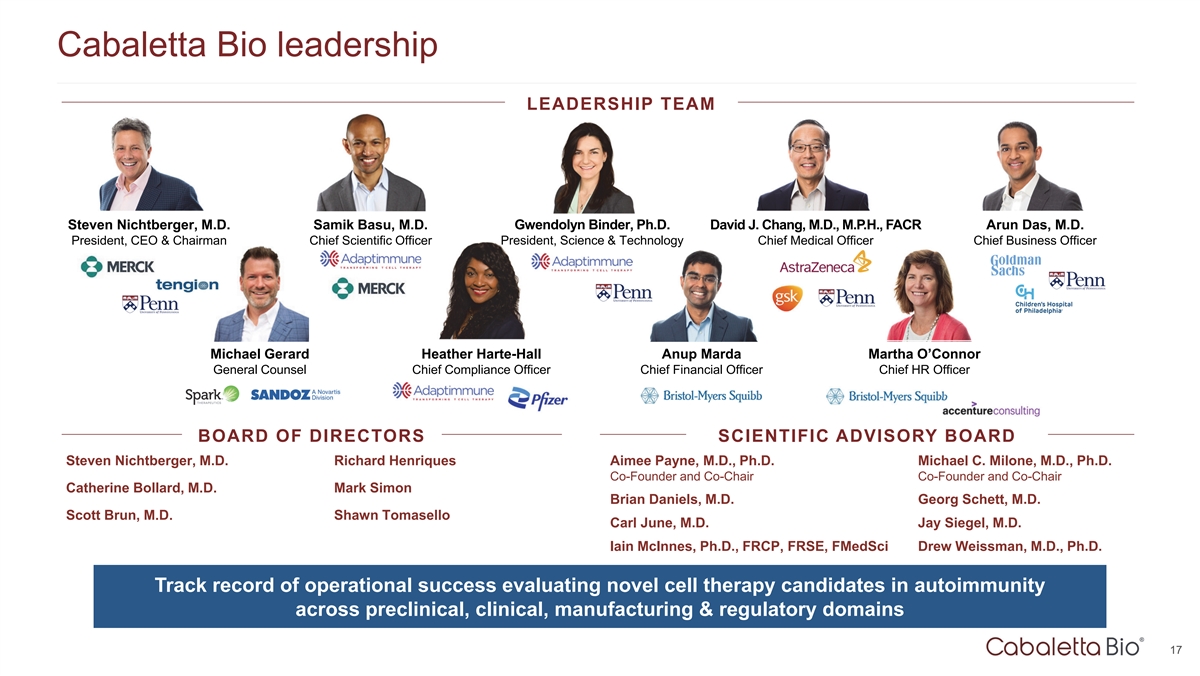
Cabaletta Bio leadership LEADERSHIP TEAM Steven Nichtberger, M.D. Samik
Basu, M.D. Gwendolyn Binder, Ph.D. David J. Chang, M.D., M.P.H., FACR Arun Das, M.D. President, CEO & Chairman Chief Scientific Officer President, Science & Technology Chief Medical Officer Chief Business Officer Michael Gerard Heather
Harte-Hall Anup Marda Martha O’Connor General Counsel Chief Compliance Officer Chief Financial Officer Chief HR Officer BOARD OF DIRECTORS SCIENTIFIC ADVISORY BOARD Steven Nichtberger, M.D. Richard Henriques Aimee Payne, M.D., Ph.D. Michael C.
Milone, M.D., Ph.D. Co-Founder and Co-Chair Co-Founder and Co-Chair Catherine Bollard, M.D. Mark Simon Brian Daniels, M.D. Georg Schett, M.D. Scott Brun, M.D. Shawn Tomasello Carl June, M.D. Jay Siegel, M.D. Iain McInnes, Ph.D., FRCP, FRSE, FMedSci
Drew Weissman, M.D., Ph.D. Track record of operational success evaluating novel cell therapy candidates in autoimmunity across preclinical, clinical, manufacturing & regulatory domains 17
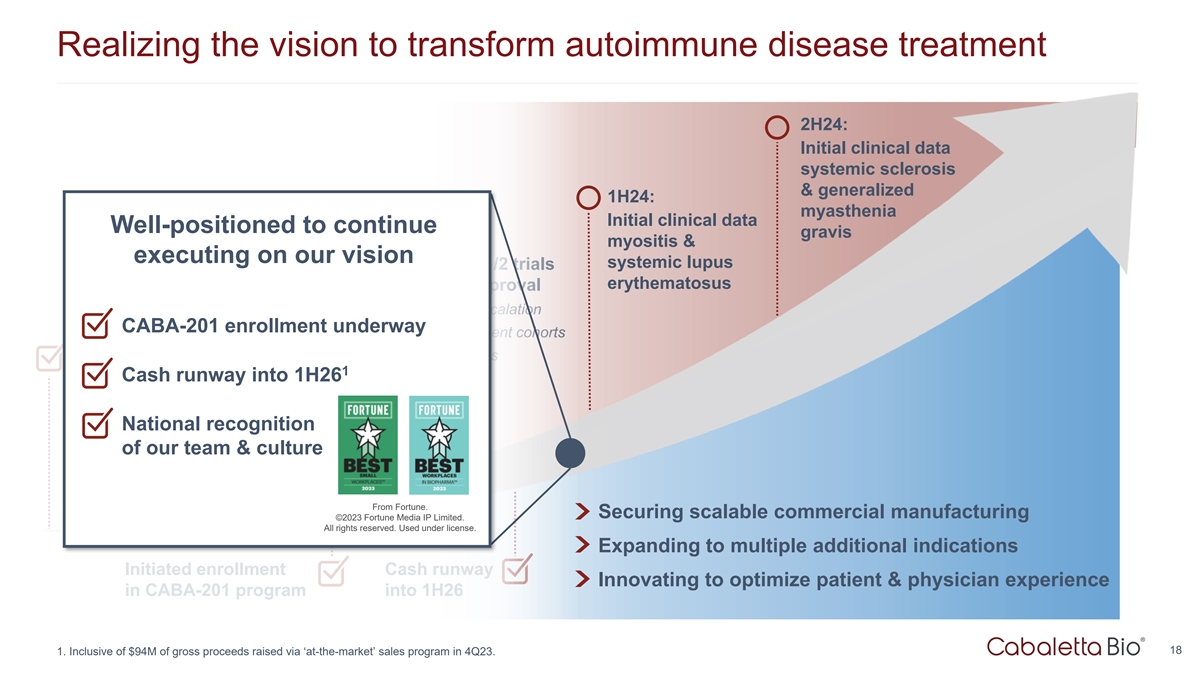
Realizing the vision to transform autoimmune disease treatment 2H24:
Initial clinical data systemic sclerosis & generalized 1H24: myasthenia Initial clinical data Well-positioned to continue gravis myositis & executing on our vision systemic lupus Designed novel Phase 1/2 trials erythematosus to accelerate
path to approval • no requirement for dose escalation CABA-201 enrollment underway • independent, parallel 6-patient cohorts • broad portfolio of indications Eng En inee gineer red ed CABA -201 1 Cash runway into 1H26 spec CABA
ifical -201 ly for use in autoimmu specifical ne ly patien for ts use in National recognition autoimmune of our team & culture patients From Fortune. Securing scalable commercial manufacturing ©2023 Fortune Media IP Limited. All rights
reserved. Used under license. Expanding to multiple additional indications Initiated enrollment Cash runway Innovating to optimize patient & physician experience in CABA-201 program into 1H26 18 1. Inclusive of $94M of gross proceeds raised via
‘at-the-market’ sales program in 4Q23.

Corporate Presentation JANUARY 2024 © 2024 Cabaletta Bio. All
rights reserved.
Exhibit 99.2

Cabaletta Bio Receives Additional FDA Fast Track Designations for
CABA-201 in Dermatomyositis and Systemic Sclerosis
– Second and third FDA Fast Track
Designations for CABA-201, following the systemic lupus erythematosus (SLE) and lupus nephritis (LN) designation, providing the opportunity for expedited development and review of CABA-201 for the treatment of these autoimmune diseases –
PHILADELPHIA, Jan. 8, 2024 — Cabaletta
Bio, Inc. (Nasdaq: CABA), a clinical-stage biotechnology company focused on developing and launching the first curative targeted cell therapies for patients with autoimmune diseases, today announced that the U.S. Food and Drug Administration (FDA)
has granted separate Fast Track Designations to CABA-201, an investigational 4-1BB-containing fully human CD19-CAR T cell therapy, for the treatment of patients with dermatomyositis to improve disease activity and for the treatment of patients with systemic sclerosis (SSc) to improve associated organ dysfunction.
“The additional Fast Track Designations for CABA-201 in both dermatomyositis and systemic sclerosis, the second
and third Fast Track Designations for CABA-201, provide the opportunity for expedited development and review of CABA-201 for the treatment of these autoimmune
indications where there is a significant unmet need, despite currently available therapies,” said David J. Chang, M.D., Chief Medical Officer of Cabaletta. “We believe these designations potentially accelerate our ability to launch the
first targeted, and potentially curative, cell therapy for autoimmune diseases driven by B cells. We look forward to continuing to leverage our research and translational insights along with our efficient trial designs in order to progress these
programs forward for patients in need of better outcomes.”
CABA-201 is designed to deeply and transiently
deplete CD19-positive B cells following a one-time infusion, which may enable an “immune system reset” with the potential for durable remission off therapy in patients with autoimmune diseases. To
date, Cabaletta has received clearance from the FDA for Investigational New Drug (IND) applications for CABA-201 in multiple autoimmune conditions including systemic lupus erythematosus (SLE), myositis, SSc
and generalized myasthenia gravis (gMG). Cabaletta is conducting four Phase 1/2 clinical trials with a total of nine cohorts that can advance simultaneously, employing a similar parallel cohort design and starting dose of 1 x 106 cells/kg without a dose escalation requirement.
About Fast Track Designation
The FDA’s Fast Track process is intended to facilitate the expedited development and review of therapeutics intended to treat serious or life-threatening
conditions and to address unmet medical needs. Companies that receive Fast Track Designation are eligible for several potential benefits, including the opportunity for more frequent meetings and interactions with the FDA during clinical development
as well as eligibility for accelerated approval and/or priority review, if relevant criteria are met. Companies may also be allowed to submit sections of their Biologics License Application on a rolling basis.
About Dermatomyositis
Dermatomyositis (DM) is an autoimmune disease that can lead to severe functional impairment that may be life-threatening despite best available standard of
care. It is characterized by a skin rash along with muscle inflammation and weakness. Although the pathophysiology of DM is not well understood, it is thought to be a subtype of myositis that is driven by B cells. DM affects approximately 43,000
patients in the U.S. alone, and typically affects middle-aged individuals, particularly women. Current treatment typically involves medications to suppress the immune system and/or chronic intensive therapies such as intravenous immunoglobulin, or
IVIg. Despite these therapies, a significant portion of DM patients have disease that remains refractory to existing medications.
About Systemic
Sclerosis
SSc is a rare and potentially fatal chronic autoimmune disease characterized by progressive skin and internal organ fibrosis that can be
life-threatening, including interstitial lung disease, pulmonary hypertension, and scleroderma renal crisis. Although the etiology of SSc is not well understood, the pathogenic role of autoantibodies and B cells in SSc provides a rationale for
studying CAR T therapy in this population. SSc affects approximately 88,000 patients in the U.S., and typically affects middle-aged individuals, particularly women. Standard treatment options, which have modest effects, include generalized
immunosuppressive agents or drugs targeted to specific symptomatic manifestations. Autologous hematopoietic stem cell transplant may provide some benefits in organ involvement, but carries significant risks, including mortality, infertility, and
secondary autoimmune disease, limiting its potential to be applied broadly. Due to the lack of adequate treatments, the risk of mortality in systemic sclerosis remains high, with an average survival of approximately 12 years following diagnosis.
About Cabaletta Bio
Cabaletta Bio (Nasdaq: CABA) is
a clinical-stage biotechnology company focused on the discovery and development of engineered T cell therapies that have the potential to provide a deep and durable, perhaps curative, treatment for patients with autoimmune diseases. The CABA™ platform encompasses two strategies: the CARTA (chimeric antigen receptor T cells for autoimmunity) strategy, with CABA-201, a 4-1BB-containing fully human CD19-CAR T, as the lead product candidate being evaluated in systemic lupus erythematosus, myositis,
systemic sclerosis and generalized myasthenia gravis, and the CAART (chimeric autoantibody receptor T cells) strategy, with multiple clinical-stage candidates, including DSG3-CAART for mucosal pemphigus vulgaris and MuSK-CAART for MuSK myasthenia
gravis. The expanding CABA™ platform is designed to develop potentially curative therapies that offer deep and durable responses for patients with a broad range of autoimmune diseases.
Cabaletta Bio’s headquarters and labs are located in Philadelphia, PA.
Forward-Looking Statements
This press release contains “forward-looking statements” of Cabaletta Bio within the meaning of the Private Securities Litigation Reform Act of 1995,
as amended, including without limitation, express or implied statements regarding: Cabaletta’s ability to retain and recognize the intended incentives conferred by Fast Track Designations for CABA-201 in
patients with SLE and LN, dermatomyositis and SSc; Cabaletta’s expectations around the potential success and therapeutic benefits of CABA-201, including its belief that
CABA-201 may enable an “immune system reset” and provide deep and durable responses in patients across an increasing number
of autoimmune diseases; Cabaletta’s belief that it is making meaningful progress toward the development and potential launch of the first targeted, and perhaps curative, cellular therapies
for patients with autoimmune diseases; the Company’s advancement of separate Phase 1/2 clinical trials of CABA-201 in patients with SLE, myositis, SSc and gMG; Cabaletta’s ability to leverage its
research and translational insights; and the Company’s expectations for the efficiency of the trial design for its Phase 1/2 clinical trials of CABA-201.
Any forward-looking statements in this press release are based on management’s current expectations and beliefs of future events, and are subject to a
number of risks and uncertainties that could cause actual results to differ materially and adversely from those set forth in or implied by such forward-looking statements. These risks and uncertainties include, but are not limited to: risks related
to regulatory filings and potential clearance; the risk that signs of biologic activity or persistence may not inform long-term results; Cabaletta’s ability to demonstrate sufficient evidence of safety, efficacy and tolerability in its
preclinical studies and clinical trials of DSG3-CAART, MuSK-CAART and CABA-201; the risk that the results observed with the similarly-designed construct employed in the recent academic publications,
including due to the dosing regimen, are not indicative of the results we seek to achieve with CABA-201; risks related to clinical trial site activation or enrollment rates that are lower than expected; risks
related to unexpected safety or efficacy data observed during clinical studies; risks related to volatile market and economic conditions and public health crises; Cabaletta’s ability to retain and recognize the intended incentives conferred by
Orphan Drug Designation and Fast Track Designation for its product candidates, as applicable; risks related to Cabaletta’s ability to protect and maintain its intellectual property position; risks related to fostering and maintaining successful
relationships with Cabaletta’s collaboration and manufacturing partners; uncertainties related to the initiation and conduct of studies and other development requirements for its product candidates; the risk that any one or more of
Cabaletta’s product candidates will not be successfully developed and/or commercialized; and the risk that the initial or interim results of preclinical studies or clinical studies will not be predictive of future results in connection with
future studies. For a discussion of these and other risks and uncertainties, and other important factors, any of which could cause Cabaletta’s actual results to differ from those contained in the forward-looking statements, see the section
entitled “Risk Factors” in Cabaletta’s most recent annual report on Form 10-K as well as discussions of potential risks, uncertainties, and other important factors in Cabaletta’s other
filings with the Securities and Exchange Commission. All information in this press release is as of the date of the release, and Cabaletta undertakes no duty to update this information unless required by law.
Contacts:
Anup Marda
Chief Financial Officer
investors@cabalettabio.com
William Gramig
Stern Investor Relations, Inc.
william.gramig@sternir.com
v3.23.4
| X |
- DefinitionBoolean flag that is true when the XBRL content amends previously-filed or accepted submission.
| Name: |
dei_AmendmentFlag |
| Namespace Prefix: |
dei_ |
| Data Type: |
xbrli:booleanItemType |
| Balance Type: |
na |
| Period Type: |
duration |
|
| X |
- DefinitionFor the EDGAR submission types of Form 8-K: the date of the report, the date of the earliest event reported; for the EDGAR submission types of Form N-1A: the filing date; for all other submission types: the end of the reporting or transition period. The format of the date is YYYY-MM-DD.
| Name: |
dei_DocumentPeriodEndDate |
| Namespace Prefix: |
dei_ |
| Data Type: |
xbrli:dateItemType |
| Balance Type: |
na |
| Period Type: |
duration |
|
| X |
- DefinitionThe type of document being provided (such as 10-K, 10-Q, 485BPOS, etc). The document type is limited to the same value as the supporting SEC submission type, or the word 'Other'.
| Name: |
dei_DocumentType |
| Namespace Prefix: |
dei_ |
| Data Type: |
dei:submissionTypeItemType |
| Balance Type: |
na |
| Period Type: |
duration |
|
| X |
- DefinitionAddress Line 1 such as Attn, Building Name, Street Name
| Name: |
dei_EntityAddressAddressLine1 |
| Namespace Prefix: |
dei_ |
| Data Type: |
xbrli:normalizedStringItemType |
| Balance Type: |
na |
| Period Type: |
duration |
|
| X |
- DefinitionAddress Line 2 such as Street or Suite number
| Name: |
dei_EntityAddressAddressLine2 |
| Namespace Prefix: |
dei_ |
| Data Type: |
xbrli:normalizedStringItemType |
| Balance Type: |
na |
| Period Type: |
duration |
|
| X |
- Definition
+ References
+ Details
| Name: |
dei_EntityAddressCityOrTown |
| Namespace Prefix: |
dei_ |
| Data Type: |
xbrli:normalizedStringItemType |
| Balance Type: |
na |
| Period Type: |
duration |
|
| X |
- DefinitionCode for the postal or zip code
| Name: |
dei_EntityAddressPostalZipCode |
| Namespace Prefix: |
dei_ |
| Data Type: |
xbrli:normalizedStringItemType |
| Balance Type: |
na |
| Period Type: |
duration |
|
| X |
- DefinitionName of the state or province.
| Name: |
dei_EntityAddressStateOrProvince |
| Namespace Prefix: |
dei_ |
| Data Type: |
dei:stateOrProvinceItemType |
| Balance Type: |
na |
| Period Type: |
duration |
|
| X |
- DefinitionA unique 10-digit SEC-issued value to identify entities that have filed disclosures with the SEC. It is commonly abbreviated as CIK. Reference 1: http://www.xbrl.org/2003/role/presentationRef
-Publisher SEC
-Name Exchange Act
-Number 240
-Section 12
-Subsection b-2
| Name: |
dei_EntityCentralIndexKey |
| Namespace Prefix: |
dei_ |
| Data Type: |
dei:centralIndexKeyItemType |
| Balance Type: |
na |
| Period Type: |
duration |
|
| X |
- DefinitionIndicate if registrant meets the emerging growth company criteria. Reference 1: http://www.xbrl.org/2003/role/presentationRef
-Publisher SEC
-Name Exchange Act
-Number 240
-Section 12
-Subsection b-2
| Name: |
dei_EntityEmergingGrowthCompany |
| Namespace Prefix: |
dei_ |
| Data Type: |
xbrli:booleanItemType |
| Balance Type: |
na |
| Period Type: |
duration |
|
| X |
- DefinitionCommission file number. The field allows up to 17 characters. The prefix may contain 1-3 digits, the sequence number may contain 1-8 digits, the optional suffix may contain 1-4 characters, and the fields are separated with a hyphen.
| Name: |
dei_EntityFileNumber |
| Namespace Prefix: |
dei_ |
| Data Type: |
dei:fileNumberItemType |
| Balance Type: |
na |
| Period Type: |
duration |
|
| X |
- DefinitionTwo-character EDGAR code representing the state or country of incorporation.
| Name: |
dei_EntityIncorporationStateCountryCode |
| Namespace Prefix: |
dei_ |
| Data Type: |
dei:edgarStateCountryItemType |
| Balance Type: |
na |
| Period Type: |
duration |
|
| X |
- DefinitionThe exact name of the entity filing the report as specified in its charter, which is required by forms filed with the SEC. Reference 1: http://www.xbrl.org/2003/role/presentationRef
-Publisher SEC
-Name Exchange Act
-Number 240
-Section 12
-Subsection b-2
| Name: |
dei_EntityRegistrantName |
| Namespace Prefix: |
dei_ |
| Data Type: |
xbrli:normalizedStringItemType |
| Balance Type: |
na |
| Period Type: |
duration |
|
| X |
- DefinitionThe Tax Identification Number (TIN), also known as an Employer Identification Number (EIN), is a unique 9-digit value assigned by the IRS. Reference 1: http://www.xbrl.org/2003/role/presentationRef
-Publisher SEC
-Name Exchange Act
-Number 240
-Section 12
-Subsection b-2
| Name: |
dei_EntityTaxIdentificationNumber |
| Namespace Prefix: |
dei_ |
| Data Type: |
dei:employerIdItemType |
| Balance Type: |
na |
| Period Type: |
duration |
|
| X |
- DefinitionLocal phone number for entity.
| Name: |
dei_LocalPhoneNumber |
| Namespace Prefix: |
dei_ |
| Data Type: |
xbrli:normalizedStringItemType |
| Balance Type: |
na |
| Period Type: |
duration |
|
| X |
- DefinitionBoolean flag that is true when the Form 8-K filing is intended to satisfy the filing obligation of the registrant as pre-commencement communications pursuant to Rule 13e-4(c) under the Exchange Act. Reference 1: http://www.xbrl.org/2003/role/presentationRef
-Publisher SEC
-Name Exchange Act
-Number 240
-Section 13e
-Subsection 4c
| Name: |
dei_PreCommencementIssuerTenderOffer |
| Namespace Prefix: |
dei_ |
| Data Type: |
xbrli:booleanItemType |
| Balance Type: |
na |
| Period Type: |
duration |
|
| X |
- DefinitionBoolean flag that is true when the Form 8-K filing is intended to satisfy the filing obligation of the registrant as pre-commencement communications pursuant to Rule 14d-2(b) under the Exchange Act. Reference 1: http://www.xbrl.org/2003/role/presentationRef
-Publisher SEC
-Name Exchange Act
-Number 240
-Section 14d
-Subsection 2b
| Name: |
dei_PreCommencementTenderOffer |
| Namespace Prefix: |
dei_ |
| Data Type: |
xbrli:booleanItemType |
| Balance Type: |
na |
| Period Type: |
duration |
|
| X |
- DefinitionTitle of a 12(b) registered security. Reference 1: http://www.xbrl.org/2003/role/presentationRef
-Publisher SEC
-Name Exchange Act
-Number 240
-Section 12
-Subsection b
| Name: |
dei_Security12bTitle |
| Namespace Prefix: |
dei_ |
| Data Type: |
dei:securityTitleItemType |
| Balance Type: |
na |
| Period Type: |
duration |
|
| X |
- DefinitionName of the Exchange on which a security is registered. Reference 1: http://www.xbrl.org/2003/role/presentationRef
-Publisher SEC
-Name Exchange Act
-Number 240
-Section 12
-Subsection d1-1
| Name: |
dei_SecurityExchangeName |
| Namespace Prefix: |
dei_ |
| Data Type: |
dei:edgarExchangeCodeItemType |
| Balance Type: |
na |
| Period Type: |
duration |
|
| X |
- DefinitionBoolean flag that is true when the Form 8-K filing is intended to satisfy the filing obligation of the registrant as soliciting material pursuant to Rule 14a-12 under the Exchange Act. Reference 1: http://www.xbrl.org/2003/role/presentationRef
-Publisher SEC
-Name Exchange Act
-Section 14a
-Number 240
-Subsection 12
| Name: |
dei_SolicitingMaterial |
| Namespace Prefix: |
dei_ |
| Data Type: |
xbrli:booleanItemType |
| Balance Type: |
na |
| Period Type: |
duration |
|
| X |
- DefinitionTrading symbol of an instrument as listed on an exchange.
| Name: |
dei_TradingSymbol |
| Namespace Prefix: |
dei_ |
| Data Type: |
dei:tradingSymbolItemType |
| Balance Type: |
na |
| Period Type: |
duration |
|
| X |
- DefinitionBoolean flag that is true when the Form 8-K filing is intended to satisfy the filing obligation of the registrant as written communications pursuant to Rule 425 under the Securities Act. Reference 1: http://www.xbrl.org/2003/role/presentationRef
-Publisher SEC
-Name Securities Act
-Number 230
-Section 425
| Name: |
dei_WrittenCommunications |
| Namespace Prefix: |
dei_ |
| Data Type: |
xbrli:booleanItemType |
| Balance Type: |
na |
| Period Type: |
duration |
|
Cabaletta Bio (NASDAQ:CABA)
Historical Stock Chart
From Mar 2024 to Apr 2024
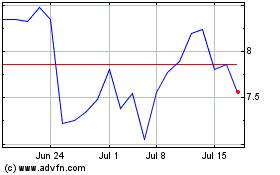
Cabaletta Bio (NASDAQ:CABA)
Historical Stock Chart
From Apr 2023 to Apr 2024
